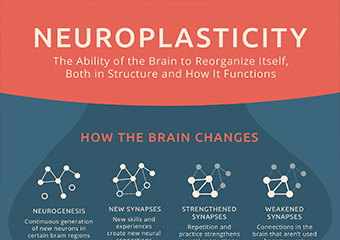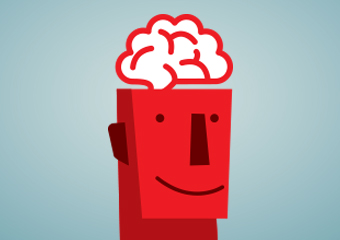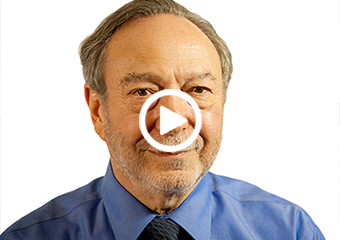How exactly does change come about? As health and mental health practitioners, our calling is to help people change. But I’m thinking about change on a number of different levels. There are the changes we help our clients make, as well as personal changes we might hope to see in our own lives. I’m also […]
Treating Chronic Pain with Mindfulness
Is medication the best way to relieve chronic pain? Most often, people who are suffering from chronic pain just want it to stop. But given the risks for drug dependency, abuse, and overdose from prescription medications, a number of doctors and researchers are refocusing their attention on alternative ways to help people experience relief. Daniel […]
How Does Neuroplasticity Work? [Infographic]
Neuroplasticity, simply, refers to the brain’s ability to change and form new connections. When neuroscience began to discover more about the brain’s remarkable ability to change, it opened up new ways of thinking about our work with patients. By harnessing the power of neuroplasticity, we can help patients think more clearly, learn more easily, develop […]
Olympic Training for the Brain?
Do Olympic athletes have strong brains as well as strong bodies? Research has shown the benefit of exercise in improving cell health (including brain cells), boosting the brain’s natural anti-anxiety drug, and strengthening the aging brain. But we still have a lot to learn about exactly how exercise changes the brain. Recently, a team of […]
How to Help Clients Process Their Fears about World Events
When you look at the news, there’s pain and violence on every broadcast. But is this something we should help our clients process? Patrick Dougherty would say yes. And he has some clear, helpful guidelines for how to bring up difficult and divisive political and social issues in therapy. It’s one way we can help […]
Could Yoga Hold the Key to Healing a Patient’s Trauma?
Approximately 10 million women in America have been physically assaulted at some time in their life. Yes, that’s a sobering statistic. But the far-reaching effects of violence against women are even darker. Over a third of these survivors experience Post-Traumatic Stress Disorder with increased rates of depression, obesity and heart disease. So how do we […]
5 Ways to Create an Anti-Depressant Brain
Depression can rob people of their sense of aliveness and vitality, interfere with job performance, disrupt relationships, and increase the likelihood of self-harm. So are there tools we can use to help clients reduce and even prevent suffering from depression? My friend, Elisha Goldstein, PhD has identified 5 natural ways to create an anti-depressant brain. […]
A Better Night’s Sleep with Mindfulness?
One of the problems with antidepressants is their side effects, such as fatigue, anxiety, loss of libido, and sleep disturbance. Dr. Willoughby Britton and her research team at the University of Arizona wanted to find out whether mindfulness could help with sleep disturbance – one of the most common side effects of antidepressants. Researchers randomly […]
Polyvagal Theory in Action – How Heart Rate Figures Into Trauma Treatments
How can the body become a resource for a patient who’s experienced trauma? Polyvagal Theory helps us answer this question by explaining how people process their environment and how the body regulates itself in the face of stress and trauma. Watch the video below as Stephen Porges, PhD shares one way to apply Polyvagal Theory […]
Can Mindfulness Change the Anxious Brain?
What helps with anxiety? Anxiety disorders represent the most common mental disorders experienced by Americans. These can range from PTSD to common phobias, and they wreak havoc in a person’s day-to-day life. A team of researchers led by David Creswell, PhD at Carnegie Mellon University recently wanted to find out what impact mindfulness practice could […]









